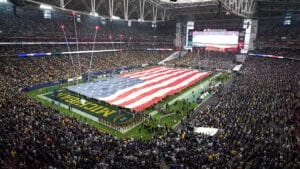This obscure phrase, once a warning uttered to the ill-fated Julius Caesar, serves now as a reminder of the coming workplace distraction otherwise known as March Madness. Since even before the days of Caesar and gladiatorial combat, humankind has been enticed with the thrill of victory, the agony of defeat, and the exhilaration of college hoops bracketology. Okay, maybe not the college hoops part until recently, but you get the picture.
According to a Gallup Poll conducted a few years ago, roughly 40 percent of Americans are college basketball fans. Those fans are likely to regularly watch games featuring some of their favorite teams. Those who may not take time to watch games on television often at least follow their team’s progress through the myriad of electronics resources now available at our disposal — from radio, to the Internet, to cell phones and pda’s.
The NCAA men’s basketball tournament in March creates the greatest enticement for even the mildly tech-savvy college basketball fan. It also creates the greatest distraction.
Anywhere from $1 billion to $4 billion will be lost in worker productivity, experts estimate, during the three-week tournament in which 65 different college teams will vie for a chance at the National Championship. This productivity is lost, in part, because the tournament games are played throughout the day, working hours included. Selection of potential game-winners, bet designations and routine game updates can take their toll on even the most dedicated and productive of workers.
If an average employee spends just 15 minutes of working time a day on hoops and makes the average wage of $18.00 per hour, this “costs” an employer $4.50 per day in lost work. With an estimated 58 million workers following the tournament, the daily loss is $250 million. That’s $4 billion over the 16 working days of the tournament.
The resulting work drop-off, otherwise known as sudden onset bracketitis, is a not an uncommon ailment during March Madness. The dreaded affliction is commonly marked by nervousness, sudden shrieks and convulsions and an insatiable compulsion to visit college team and sports websites for updates on the tournament brackets.
These sports websites host greater amounts of material and live access with each passing year. Live tournament games are even available via the Internet thanks to CBSSportsline.com. In the first day of the tournament last year, over 3.4 million hours of streaming video and audio from the tournament were consumed by visitors to the CBSSportsline.com page. The highly-touted “Boss Button” was clicked over 1.7 million times on the first day alone. If its less-than-dubious title did not reveal its purpose, the “Boss Button” hides the live action video feed on the screen and silences the audio on the CBSSportsline.com page, replacing it with a “businesslike” image designed by cartoonist Scott Adams, the creator of the Dilbert comic.
Despite the efforts taken by some to conceal sports website distractions from supervisors, many supervisors already know that their employees are actively involved in the frenzy of March Madness. Some supervisors even promote it. According to the Society for Human Resources Management, approximately 30% of all employers know that NCAA office pools are taking place in their offices.
This leads us, of course, to the risks of betting. Social gambling generally is permissible under Arizona law with some important caveats — not that police have resources or the interest to raid the typical, small-scale office betting pool.
Employers, nonetheless, must be wary. Those employers with policies against workplace gambling who look the other way for sports pools may face questions and accusations of selective enforcement when trying to enforce those policies against more serious on-the-job gambling. Claims of selective enforcement may even erupt when employees are disciplined for wasting company time, but can readily pinpoint other employees who invest hours of work time on office pools. Selective enforcement accusations fuel claims of discrimination. Many claims of discrimination are often won or lost based on little more than selective enforcement of company policies.
Employees who decline to participate in office pools may also face peer pressure or ostracism by co-workers. Even those who participate may face taunting throughout the tournament. Trash-talking and other inappropriate behaviors are common-place during March Madness.
To reduce these risks, employers should establish their policy stance towards March Madness now, not in March. Prohibiting managers and supervisors from coordinating or soliciting employee involvement in pools or gambling is one measure that employers should follow as a minimum. Employers may also strictly enforce their Internet access policies, monitor Internet usage, and take action against employees who “go mad” and invest too much time in tournament watching or who otherwise act out.
Such strong positions may not be necessary, but they serve as a reminder of what actions employers may take if things get out of hand. Lesser approaches, such as limiting tournament activity time to break and lunch periods may prove more than adequate. Whichever approach one takes, it is also worth explaining the company’s position to all employees to ensure consistency and understanding.
Also, we should not forget that employees who exhibit a compulsiveness beyond mere appreciation for the tournament may need more help than human resources is normally equipped to provide. The Arizona Office of Problem Gambling offers a litany of resources to help. These include counseling, treatment programs and literature on warning signs and symptoms.
For many of us, March Madness is a rite of passage in the Spring – a chance to build camaraderie with co-workers, reconnect with college friends and indulge in chicken wings and all the fixin’s with family. As long as the need for responsible workplace behavior and attention to job duties is communicated along with other office policies, March Madness will continue to be a revered tradition in the workplace and elsewhere for years to come.




